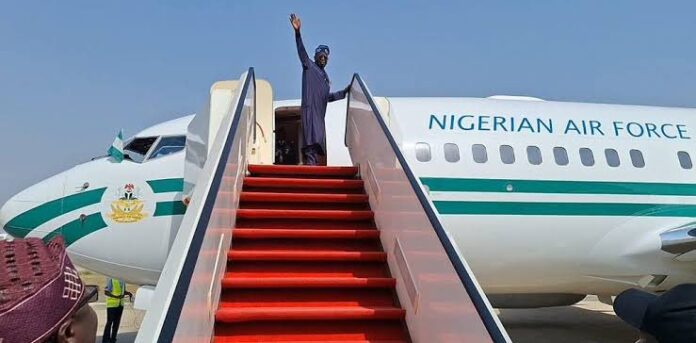In a significant blow to Nigeria’s image on the international stage, a French court has authorized the seizure of three presidential jets belonging to the Federal Government of Nigeria. This development has not only highlighted the country’s ongoing leadership issues but also stirred controversy over the administration’s handling of public funds and transparency.
The seized jets include a Dassault Falcon 7X, a Boeing 737, and an Airbus 330. The latter, an expensive purchase at over $100 million, was bought by Nigeria but had not yet been delivered. The two other jets were recently listed for sale. All three aircraft are currently undergoing maintenance at various airports: Le Bourget in Paris and Basel-Mulhouse in Switzerland.
The seizure follows a legal dispute involving Zhongshan, a Chinese company that had a contract with the Ogun State government. In 2016, the Ogun State government revoked Zhongshan’s export processing zone management contract, leading Zhongshan to pursue legal action. An independent arbitration tribunal awarded Zhongshan approximately $74.5 million in compensation, which the Ogun State government has yet to pay.
This legal battle has now escalated, with the French court issuing an order that prevents the movement, sale, or purchase of the seized jets until Zhongshan is compensated. The court’s decision has placed Nigeria in a difficult position, highlighting the nation’s struggle with governance and legal accountability.
The situation has ignited widespread criticism of the federal government, which is accused of being insensitive to the dire economic conditions faced by many Nigerians. Critics argue that spending large sums on presidential jets while the country grapples with high poverty levels and food inflation reflects a significant disconnect between the government and the people’s needs.
The controversy is compounded by previous issues with Nigerian-owned properties in Liverpool, England. A UK court had earlier seized two buildings linked to Nigeria, also due to the ongoing dispute with Zhongshan. This international legal conflict has added to the negative perception of Nigeria’s governance.
The roots of this conflict can be traced back to a 2010 agreement between Zhongshan and Ogun State for the development of Fucheng Industrial Park within an export processing zone. The agreement allowed Zhongshan to manage the park, but tensions arose when Ogun State terminated Zhongshan’s management contract in 2016. Zhongshan’s subsequent legal actions were supported by an investment treaty between China and Nigeria.
The federal government’s handling of this situation has been called into question, particularly regarding its efforts to resolve the dispute. Despite repeated appeals from the federal government for an amicable settlement, the issues remain unresolved. Critics argue that this reflects a broader pattern of poor leadership and disregard for legal and financial obligations.
The controversy surrounding the presidential jets and the broader issues with international legal disputes underscore ongoing concerns about transparency and accountability in Nigerian governance. Federal and state governments are urged to address these issues openly and resolve disputes in a manner that avoids further embarrassment and financial loss.
As the situation develops, many Nigerians are calling for greater transparency in how government assets and funds are managed. The government has yet to provide a detailed response or explanation regarding the seizure of the jets and the ongoing legal disputes. For now, the public and international observers await further updates on this complex and troubling situation.

